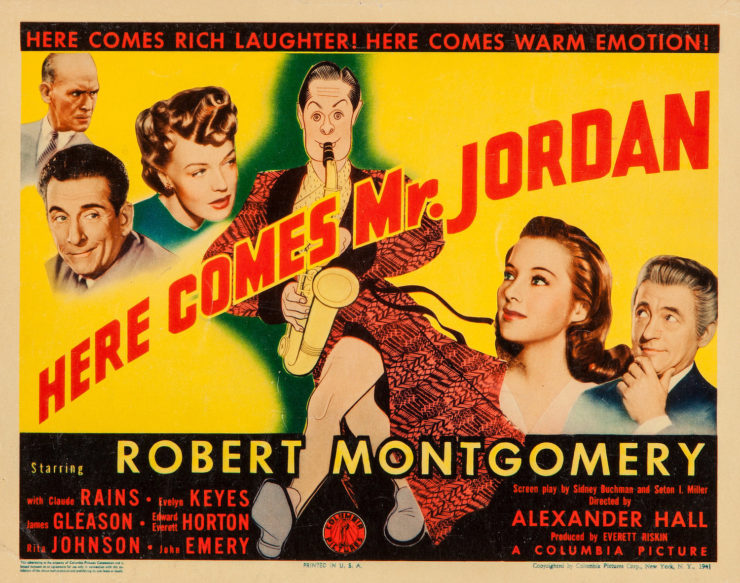Afterlife fantasies—from Dante’s Divine Comedy to Pixar’s Soul—have always been a unique way to look at society. In this short series, I’ll be looking at the film tradition of afterlife fantasies, and discussing the recurring themes and imagery across a century of cinema.
Last time I set sail with Outward Bound and Between Two Worlds, two films that followed a group of souls on a journey between life and death. Today I’m wrestling with four interrelated films, three starring a personification of Death, and one starring…the Devil! Here Comes Mr. Jordan, Angel on My Shoulder, Heaven Can Wait, and Down to Earth all tell the same basic story of a deceased man who gets a second crack at life because of a bureaucratic error in the afterlife—which then requires an afterlife official using dubious body-swapping shenanigans to fix. Two of the films feature a character named “Mr. Jordan” (the aforementioned afterlife official) who makes sure all the dead people get to where they need to be, while the other films feature characters who are clearly riffs on Mr. Jordan. I will admit here that it took me an embarrassingly long time to understand that “Mr. Jordan” was a reference to the Jordan River and the crossing thereof—thus, his name is basically “Mr. Death.”
Like Outward Bound, Here Comes Mr. Jordan, was also based on a play, and…actually, bear with me for a second.
Playwright Harry Segall wrote a comedic fantasy titled Heaven Can Wait, which was adapted into a film called Here Comes Mr. Jordan in 1941. (Segall won an Oscar for Best Original Story!) In 1946, a dark riff on the story was produced called, and I am not shitting you, Me and Satan.
ME AND SATAN.
Unfortunately, one of the producers decided that was a little much, and the title was changed to Angel on My Shoulder. (If you watch the movie this seems to imply that the titular angel is Lucifer, which seems far darker than just leaving the original title, which fucking ruled? But this is why no one lets me run a movie studio.) Meanwhile, Here Comes Mister Jordan spawned a 1947 musical comedy sequel about a muse consulting on a Broadway play called Down to Earth. (Down to Earth was later remade remade with Olivia Newton-John as the 1980 disco rollerskating extravaganza Xanadu, which was incidentally one of the inspirations for the founding of the Golden Raspberry Awards.) In 1978, Mister Jordan was remade with Warren Beatty as Heaven Can Wait. In 2001, Mister Jordan was remade yet again as a vehicle for Chris Rock, but was, presumably out of sheer perversity, titled Down to Earth.
None of these movies have anything to do with the Ernst Lubitsch’s 1943 movie also titled Heaven Can Wait, which tells a completely different story that mostly focuses on life on Earth, and which I’ll touch on in the next post in this miniseries.
I hope all of this is clear.
Here Comes Mister Jordan (1941)
When Here Comes Mister Jordan hit theaters, World War II was raging across much of the planet, and the U.S. was only five months away from joining the fight—which is why it’s always weird to me that there is no mention of it in the film. The movie’s plot sticks to the proto-slobs-vs.-snobs aesthetic that was popular throughout the Depression, and, even in scenes set in the afterlife, never acknowledges the idea that an extraordinary number of people might be dying overseas.
What we do get is Joe Pendleton, a good-hearted, honorable prizefighter who’s not that bright, but is very proud of being “in the pink,” meaning in good health. He has two hobbies: he plays the sax (badly) and flies planes (a little better) which are both kind of weird given that he seems to be a working-class hero in the early ‘40s? The second habit has earned him the nickname “The Flying Pug”, and it leads directly to The Plot, as he crashes his plane on the way to a big fight. Messenger 7013, played by the incomparable Edward Everett Horton, snatches him out of the plane a few seconds early to save him the pain of the crash. 7013 is referred to only by his number, and seems to be part of a vast number of Messengers who collect newly-deceased people and usher them out of life. His interactions with Joe, and with his boss, Mr. Jordan, imply the existence of a vast cosmic bureaucracy of which he is a striving, not-quite-middle-management-level cog. Unfortunately for Joe, 7013 is very new, and has shuffled him out of his mortal coil about fifty years ahead of schedule.
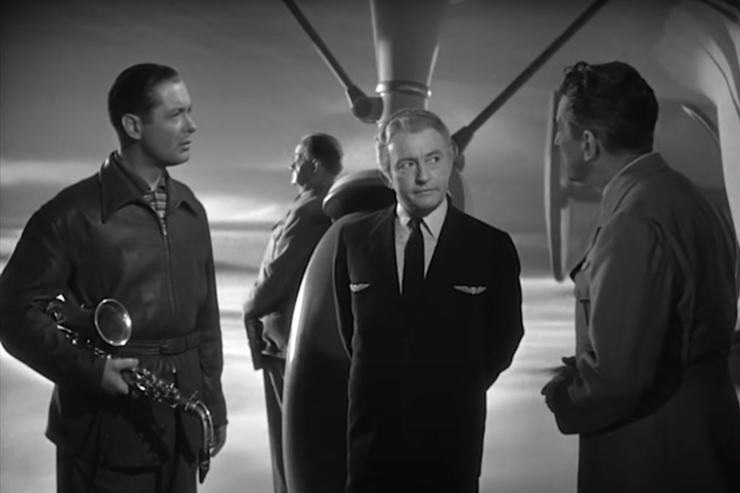
7013 leads Joe across a seemingly endless cloudscape. A line of people are queued up to board a sleek plane. None of them fight their fates. Again, presumably this is because some part of Joe knows he’s not supposed to be dead yet, which is why he makes enough of a fuss for Mr. Jordan to learn about the mix-up.
7013 deals with his protests by demanding he show respect for Mr. Jordan (as though Joe’s supposed to know who he is), literally shushing him like a child, snapping “For Heaven’s sake be quiet!”, and, at one point, sniping “You were a prizefighter” when Joe tells Mr. Jordan about his profession. When Mr. Jordan can’t find Joe on his list, he has the plane’s pilot contact “The Registrar”, who tells them that Joe’s parents “are happily withdrawn” and that Joe is scheduled to rejoin them…in 1991.
So we get both messages: the individual is subject to their fate: Joe’s whole life has been planned, its end point is already determined, there’s a “Registrar” keeping track of everything, and they’re also keeping tabs on Ma and Pa Pendleton while they wait for their son to “rejoin” them. The relationships that death interrupted will be restored in a more eternal fashion. BUT ALSO, Joe was right to follow his instincts and insist that he didn’t “feel” dead, because if he’d just gotten in line like a good dead person he would have been delivered to the afterlife fifty years before his time, and presumably gummed up the Cosmic Works. The film seems to be saying: submit to authority and trust that powerful entities are in charge, but also, argue with powerful entities because they might be wrong…simultaneously?
Another interesting thing, to me at least, is Joe’s utter lack of curiosity with regards to the structure of the afterlife. He doesn’t ask about his parents or any other deceased friends. He doesn’t try to talk to anyone any higher up the food chain, so to speak. He just wants them to fix the mistake and send him back.
Mr. Jordan takes the case over personally to help Joe hunt up a new body—one that’s “in the pink” so he can still make it to his big prizefight with “K.O.” Murdock. (Who, yes, is Matt “Daredevil” Murdock’s grandfather in my mind, and you can’t make me believe otherwise.) The search leads to an ongoing conversation between Joe, Mr. Jordan, and 7013 where they talk about how the body is “just a covering”, “like an overcoat”, and that no matter what body they put Joe in, “the soul of Pendleton will always shine through.”
They find him a body, a rich playboy/murder victim named Farnsworth. Joe only agrees because a lively girl named Betty Logan shows up to plead for her father, whom Farnsworth is using as a patsy in a crooked business deal. (It’s complicated.) But Joe falls in love with her at first sight, the big lug, and for a few scenes you probably think you know where this is headed: Joe has to get Farnsworth’s body “in the pink”, avenge his murder, and get the girl, no?
Not exactly.
Mr. Jordan caters to Joe’s needs, and it’s all very wacky in a “Golden Age Hollywood Fantasy” way. It seem like true love will triumph. But once Mr. Jordan learns that Farnsworth’s body is fated to be murdered again, the tone shifts again. Joe is destined to be champion, and that can’t be undone, but that means he has to drop into the body of the newly-murdered “K.O” Murdock—the fact that this might cost him the burgeoning relationship with Betty, or that it might mean Farnsworth’s murderers aren’t brought to justice, is inconsequential.
Mr. Jordan remains suave, droll, and implacable. He’s not a human, and human behavior often cause him to lean in with a peculiar, anthropological gleam in his eye. In fact, he never says what he is. He and 7013 wear winged lapel pins reminiscent of pilots and flight attendants, but no one ever refers to them as angels. Unlike Outward Bound, the film’s afterlife is not even tangentially tied to a religious structure. And when Joe has to die a second time—this time on screen, in Farnsworth’s body—he argues with Mr. Jordan, insists he won’t go, and even begs for his help, all while Mr. Jordan watches with his usual look of cat-like interest. He has a job to do, fate is inexorable, and Joe’s pleading will accomplish nothing.
In fact, the only time this cool demeanor cracks is in the moment before Joe-as-Farnsworth is shot. Joe asks why he can’t stay as Farnsworth for Betty’s sake. When Mr. Jordan says, “it wasn’t meant to be that way” Joe protests that “That’s no answer!” and Mister Jordan, so courteous to Joe up to this point, fixes him with an icy look of disapproval and says: “On the contrary it’s the perfect answer.” And then, an instant later, he’s back to being understanding and at least a little sad about Joe’s plight. It’s an extraordinary moment from Claude Raines, who lets the veneer slip the tiniest bit to show us that Mr. Jordan is more ancient and powerful than Joe can imagine.
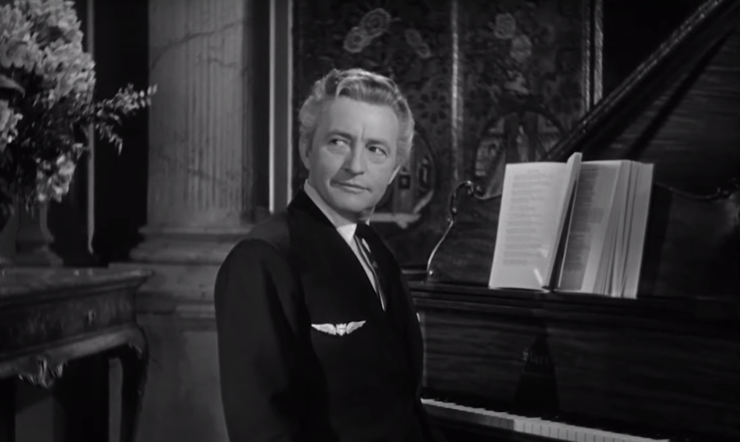
A scene later and he’s once again reassuring him, “You won’t be cheated! In the final reckoning all will be accounted for”—which is an interesting way to balance the film’s needs, especially given that part of the plan is for Joe to lose all memory of being Joe and Farnsworth, and to instead fully become K.O Murdock. Which happens despite the fact the Joe says clearly that he doesn’t want to lose his memories, or lose Betty. It’s all “accounted for” because Betty recognizes the soul of Pendleton in Murdock’s eyes, but Joe Pendleton doesn’t know that, because Joe Pendleton, at least for the duration of Murdock’s life, has ceased to exist. Which is…horrifying?
Yes, human individuality is important, and in Hollywood Theology individuality = soul. But! Authority is also important. (You let humanism go too far and people start demanding way more rights.) The film solves this in a manner similar to Outward Bound, and a way that will set a sort of template for all the films that follow. There is an overarching Plan, it’s benevolent, and has your best interests in mind. But you can’t always be trusted to know your own best interests. So the Universe will coddle your demands and honor your needs up to a point—but in the end the Plan will win.
Usually.
Here Comes Dark Universe Mr. Jordan: Angel on My Shoulder (1946)
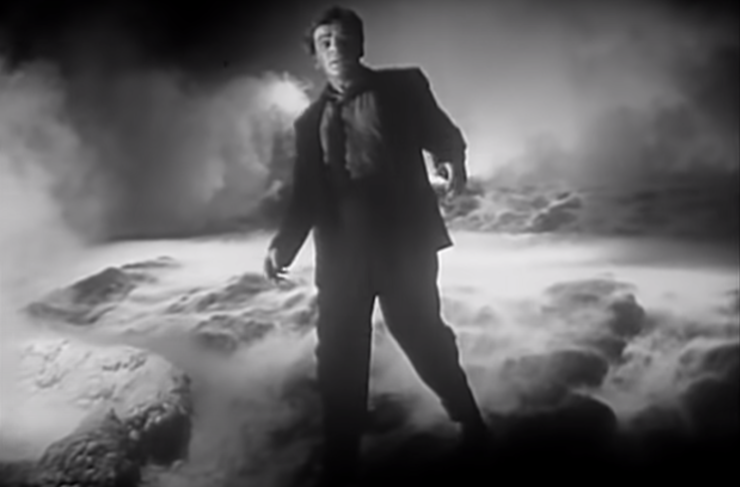
As I mentioned, Angel on My Shoulder is also based on Harry Segall’s original play, and features Claude Raines playing a droll-until-he’s-terrifying Mephistopheles instead of the droll-but-kind Mr. Jordan. Small-time gangster Eddie Kagle (Paul Muni) gets doublecrossed, plugged with his own piece, and winds up in Hell, which is AMAZING, but also a pretty traditional fire and brimstone scenario, with spurts of fire everywhere, shirtless men shoveling coal and bossing the damned around. (There are many moments in my life when MST3K quotes pop unbidden into my mind, and every single time Hell was onscreen I heard Mike Nelson saying, “Oh, sure—Hell gets an NEA grant!”)
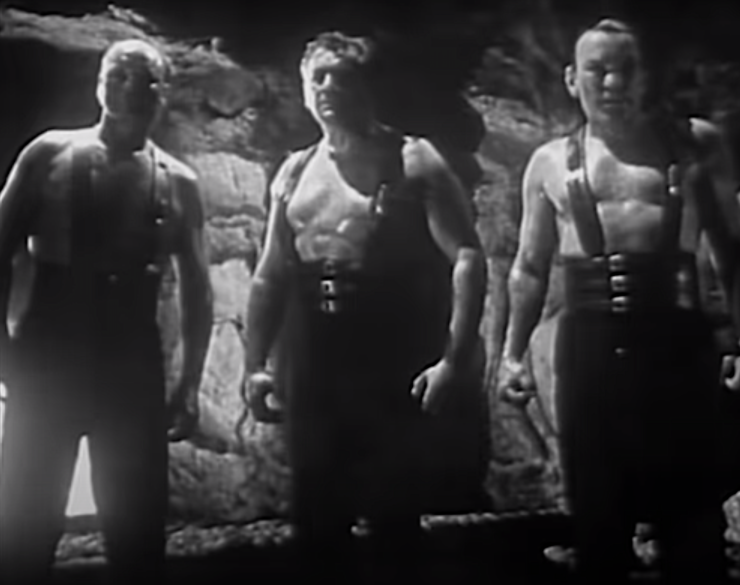
And as if that wasn’t enough to make me love this weird little movie, literally the minute Eddie gets to Hell, this exchange occurs:
A Damned Woman: “Gosh it’s hot here. It gets like this Florida sometimes…”
Eddie: “Nah, Florida never smelled like this—like rotten eggs!”
To which I say: someone hasn’t spent enough time in Florida! But Hell’s close enough, I guess.
The plot inverts Here Comes Mister Jordan’s sweet nature, with Eddie wanting a crack at life in order to plug the guy what plugged him, and Nick using Eddie to ruin an activist judge’s reputation. In the film’s handwavy cosmology, every person on Earth has a doppelganger, and Eddie’s just happens to be Judge Parker, a man who’s using his platform to help poor children so they don’t turn to a life of crime. Obviously the Devil hates this, and Nick is able to put Parker into a coma, allowing Eddie to use Parker’s body as a puppet. But, as in Mister Jordan, an enchanting dame gums up the works. This time the dame is Judge Parker’s fiancee, Barbara, who is unfazed by her partner’s personality shift—he’s been having some severe anxiety issues and mood swings, and the movie has a shockingly good attitude toward mental health. Her unwavering love gradually inspires Eddie to act like a man who might deserve her. As in the other takes on the Mr. Jordan template, the lone individual has to fight against an otherworldly authority, but this time it’s the murderer Eddie Kagle fighting Hell Itself to give Judge Parker another shot at life with Barbara.
The movie takes a delightfully straightforward approach to the journeys between worlds: Nick leads Eddie into one of the furnaces, the two begin to rise seemingly on the steam, and then that gradually transforms into a freight elevator that rises up into a sidewalk back on Earth.
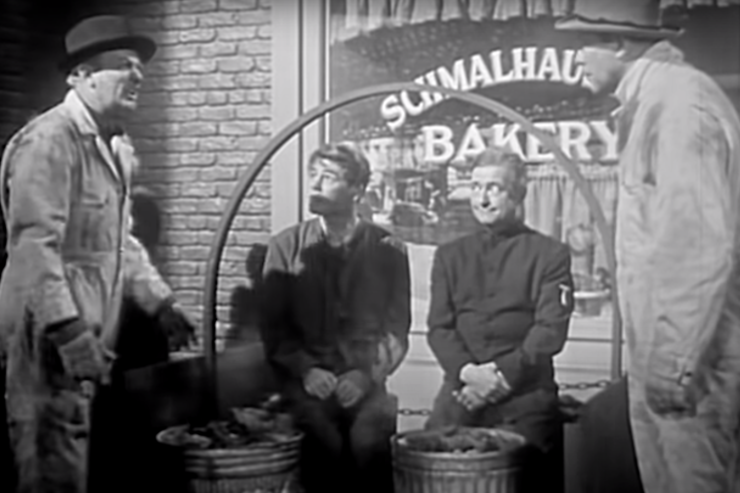
The other great thing is that Claude Raines plays Nick almost exactly the same way he plays Mr. Jordan. There’s the same amused observation, and occasional fascination with human nature, and he only openly threatens Eddie a few times. The most interesting element is how the movie plays with the tension between individuality and fate. Somehow, Eddie is strong enough to escape his demon captors and get to Nick’s office, which implies that he has a stronger will than the other damned souls, who are all resigned to their fates. Nick rewards his strength with a shot at a second chance for vengeance. BUT! The film also gives us a darker twist on the idea that everything unfolds according to a design. First, in one excellent soliloquy, Nick yells at Heaven about how he’s always doomed to lose to God. But more interesting for my purposes: Eddie’s redemption doesn’t ultimately matter. His love for Barbara, the clear fact that he had a rough childhood and would have become a better person with more of a chance, the fact that he doesn’t, in the end, kill his murderer—none of that matters. In the film’s cosmology, he seems to have bested Satan by living a moral second life as Judge Parker. He could demand any number of things of Nick. Instead he makes a grand sacrifice and promises to return to Hell, on the condition that Nick leaves Judge Parker and Barbara alone to live a happy life. Nick agrees, and at this point I expected that Nick wouldn’t be able to take him back, that he would now be given a second chance or Purgatory or something.
Nope. He and Nick walk through the street, and Eddie says, Funny, I never thought people’s faces looked so good. Lots of other things I never noticed before. If I’d only known the first trip around what I know now…” In response, Nick says he’s going to introduce him to “agonies undreamed of”—but Eddie’s ready with a retort: “You made a sap of yourself. You don’t want your boys to know that. No big shot wants to look like a suck before his own mob. Now, if I was made a Trustee…” a suggestion which Nick calls “sheer, unblushing blackmail.” Given the look of fright on his face, though, he’s going to meet Eddie’s terms.
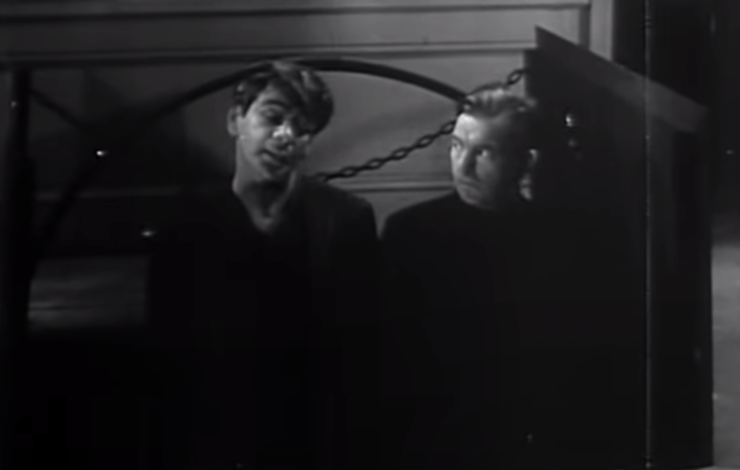
Here we have an interesting solution to the question of whether a mortal can go up against the workings of the Universe. The only hint that Eddie’s virtuous time on Earth has changed his fate is that Nick might make him a Trustee in Hell. BUT at the same time, this movie posits a universe where a human can successfully beat the Devil, call him brother, and set his own terms with him. So Eddie Kagle’s one up on most Fausts and Daniel Johnson.
I’ll admit I was shocked—shocked!—to discover that the universe didn’t bend itself around the man’s redemption. God gives John Constantine another shot in Constantine! Eru Ilúvatar kinda sorta pushes Gollum into Mount Doom so Frodo can live, even after he was taken over by the Ring! Willy Wonka gives Charlie the Chocolate Factory despite the boy’s verboten swig of Fizzy Lifting Juice! But here, apparently, the man had already been damned for his crimes, and there’s simply no undoing that.
Written for the Screen by Elaine May: Heaven Can Wait (1978)
1978’s Heaven Can Wait is surprising for the ways it doesn’t ultimately update Here Comes Mr. Jordan—especially given the important tweaks to the opening. Written by perfect glowing human Elaine May, and co-directed by Warren Beatty and Buck Henry, the movie surprises me every time I watch it with just how conservative it is. The only concession to the late-70s seems to be that Beatty’s Joe Pendleton (here a football QB rather than a boxer) is obsessed with creating all sorts of powder-and-raw-egg smoothie concoctions. Instead of flying, health nut Joe is hit by a truck while he’s bicycling through a tunnel, and once again his finely-honed reflexes were meant to save him. Co-director Buck Henry plays Joe’s unnamed “Escort”, and James Mason is revealed as the suave-as-hell Mr. Jordan.
To connect with Joe’s Earthly tunnel, the movie cuts to darkness with a circle of light, which gradually grows and dissolves into the light coming from the dead people as they walk through a portal into a cloudscape. Joe’s Escort tells him: “This is not your ultimate destination, it’s a Way Station. That (he points to a sleek Concorde-looking plane) will take you to your ultimate destination.” Joe, who thinks he’s dreaming, runs around like a little kid and literally hides from the increasingly exasperated Escort, who finally snaps that the rules of the Way Station are “a product of your image, and those who share your image—if you violate the rules, if you question the unifying principles…”
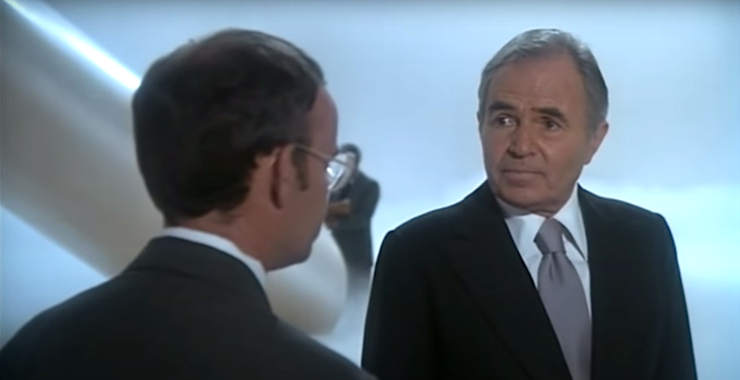
Which is already more afterworldbuilding than the original HCMJ ever did. But once again, Joe shows no desire to learn more, instead distracting the Escort with a sleight of hand trick. When Mr. Jordan finally gets through to him that he’s dead, Joe, as in the earlier version, insists there’s been a mistake, which alarms the Escort:
Escort: You’re talking to Mr. Jordan!
Joe: Anybody can make a mistake!
This is a light, tossed-off moment, but it’s still a giant step from the likes of Outward Bound and the original Mister Jordan, with Joe showing zero reverence or awe in the face of these ancient beings, and simply assuming they’re all on a level playing field. And while the Escort sputters in shock, Mr. Jordan himself doesn’t take offense. Instead he tries to shuffle Joe along by appealing to his sense of fairness:
Mr. Jordan: “If you don’t take your place the others won’t be able to complete their journey. Do you think that’s fair?
Joe: I’m not supposed to be fair! If this is really Heaven, you’re supposed to be fair! I didn’t make any mistake!
Escort: This is not Heaven! This is a Way Station!
So we have a definite push back on the idea that this is Heaven, with the idea that this place has been manufactured for Joe, and people from his culture, to follow rules he’ll accept. There is no mention of his parents waiting for him, and Joe’s tone in this isn’t as pugnacious as the previous Joe’s—he’s kind of an inverse “Let me talk to your manager” personality, where he’s assuming there’s been an innocent mistake and it can be fixed, no harm, no foul. Buck Henry’s Escort is, if anything, more fussy and officious than Edward Everett Horton’s 7013but he doesn’t push back on Joe saying that the afterlife is supposed to be fair, just on the fact that he uses the term “Heaven” incorrectly. And again, there is no curiosity on Joe’s part about who the Escort and Mr. Jordan are, what their titles are, or who they work for. Even after he accepts his new reality, he never asks questions about the larger workings of the universe.
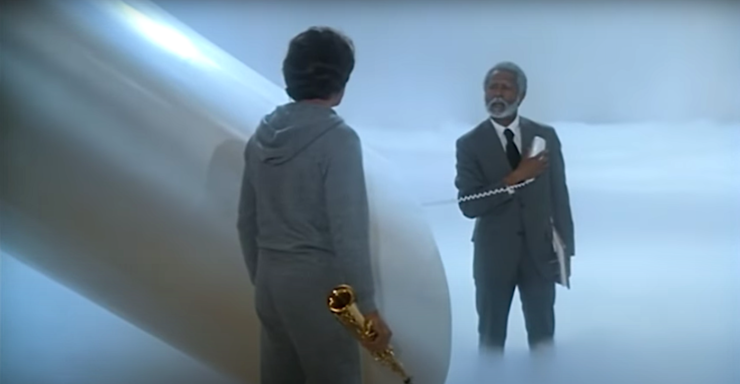
When Mr. Jordan looks him up it’s because “The likelihood of one individual being right increases in direct proportion to the intensity with which others are trying to prove him wrong”—again, an interesting departure from earlier films, and a gorgeous idea to put in a movie like this, where the “others” are basically the middle management of the afterlife, whom one would hope would have their shit together. In Heaven Can Wait, the individual can definitely fight back against the system, whether in the afterlife, as in Joe’s case, or on Earth, as with this film’s version of Betty Logan. Where in the original Mister Jordan, Betty Logan was fighting a personal battle, to save her wrongly-accused father from being used as Farnsworth’s patsy, this one is fighting Farnsworth’s global corporation on the grounds that they’re polluting entire regions of rural England.
This makes it all the weirder when the film sticks to the original’s ending almost note-for-note. The Escort returns to tell Joe “your time is up—you don’t fit” as Farnsworth, and when Joe protests, answers with a vague “it wasn’t meant to be.” Mr. Jordan tells him that Joe “must abide by what is written” but also reassures him not to be afraid, because “there’s a plan—there’s always a plan.”
Then just as in the earlier version Joe is dropped into a former opponent, this time his teammate, Jarrett, and informed that he’s about to lose all of his memories and fully become Jarrett. Except in this version Mr. Jordan chooses to do this while Joe is being interviewed on TV. (Dick move, Mr. Jordan!) And, just like that, Joe become Jarrett fully, with no memory of the prior few weeks.
Especially given how the rest of the film emphasized the importance of fighting for the rights of the individual, it startled me that May and Beatty didn’t choose to revamp the ending so that Joe was able to keep his memories and personality. We’re supposed to buy that rabblerouser Betty Logan will just fall in love with Jarrett now, as thought he’s interchangeable with Joe-in-Farnsworth’s-body? And from a purely commercial viewpoint, wouldn’t that have played better in the Me Decade? But that’s nothing compared to how jarring this traditional ending it when it shows up in the most recent addition to the Mr. Jordan Universe.
Here Comes Mr. King: Down to Earth (2001)
In the 2001 reboot of Here Comes Mister Jordan, Down to Earth, Chris Rock plays Lance Barton, a stand-up comic/bike messenger, who dies before his time and ends up taking the body of the very rich and very white Charles Wellington III. Much of the film’s humor is mined from Lance forgetting repeatedly, that he’s now in Wellington’s body, so when he tries to do his old material about growing up poor, or uh, says all the words in a DMX song (RIP), people are justifiably displeased.
The innovations are interesting: This is the only version of the Mr. Jordan story where he technically meets his love interest before his accident, when he dies the way I hope to: gazing into the eyes of Regina King. This makes the story feel much more like Lance is a cog in a unchangeable destiny. This also results in an even stranger tonal shift at the end, when, having been booted out of Charles Wellington III, his soul is planted in the body of fellow comedian Joe Guy. Once again I thought a more modern version of the story would be more invested in the individual’s fight against fate, but no—he goes onstage in Joe’s body, does his own material (which would be very weird for the audience that came to see Joe Guy, no?) then learns that he’s about to lose his memories and live the rest of his life as Joe.
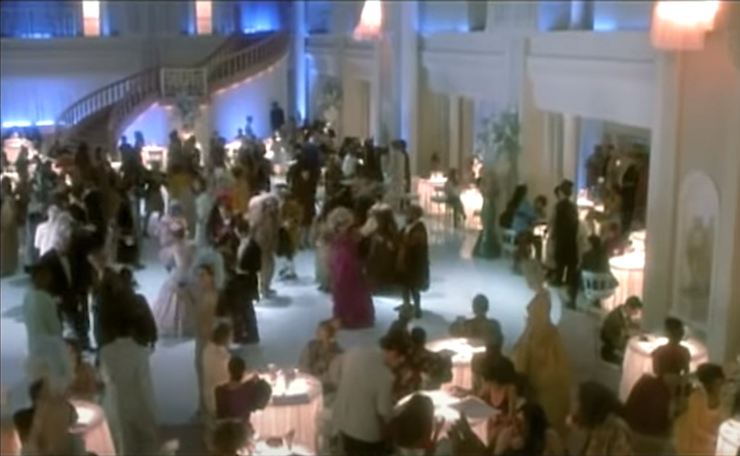
As for the other innovations: instead of a cloudy Way Station Lance explicitly goes to Heaven, which we get to see—a club/casino/cocktail lounge with a line at the door and a literal velvet rope. (One man tries to jump the line and is told to “Go to Hell.”) Instead of a fussy, unnamed Messenger/Escort, we get Keyes, played by a criminally under-used Eugene Levy. Instead of suave Mr. Jordan we get Chazz Palminteri’s “Mr. King”, who plays the role like a mobbed-up casino manager and berates Keyes for once turning Frank Sinatra away at the door:
Keyes: “He wasn’t wearing a jacket!”
Mr. King: “He’s Frank Sinatra! He can wear what he wants!”
The reality here is fuzzy at best. When Lance demands to be returned to Earth, Mr. King tells him he spoke “to my boss”—to which a stunned Lance replies “You talked to God???” which… shouldn’t be that surprising to a dead person in this film’s implied cosmology? A moment later Mr. King assures Lance that this is “all part of some grand plan” as the earlier versions of Mr. Jordan do, but when Lance presses him, Mr. King shrugs and says, “Yeah, sure. Let’s go find you a body.” Is he making the grand plan up? Is he trying to cover his ass? He also manipulates reality at will, at one point plucking an Earthly martini from a corporeal tray and announcing, “I’m a friggin’ angel! I can do what I want!” In the biggest departure, Mr. King threatens Lance, reminding him that “there’s a third option” beyond getting him a new body or taking him back to Heaven.
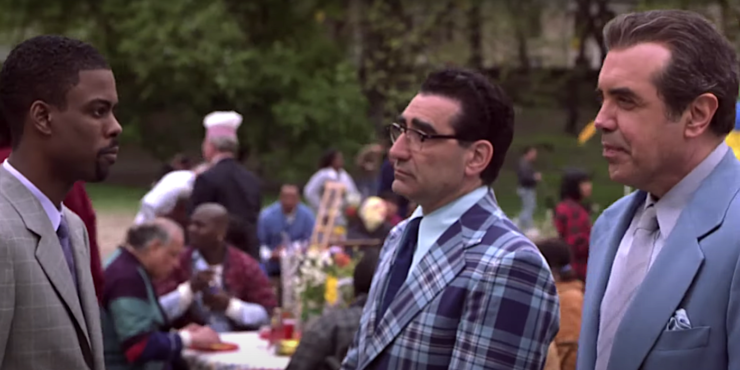
When Lance learns he’s fated to die in Wellington’s body, he loses it at Mr. King, yelling that according to King and Keyes all the bad things that happen to him are “fate” and all the good things are “luck”—“Is anything good supposed to happen to me?” In the midst of this not-very-good film, Chris Rock pulls off a startlingly raw cri de cœur here—which the movie then absolutely refuses to acknowledge. Instead we’re slotted right back into the track established in the original Mister Jordan. The individual-vs-the system tension that has played out so disjointedly in the prior iterations of the story feels even worse in Down to Earth because it does seem like Lance is being targeted by a cosmic conspiracy. Add to that that this film’s version of Betty Logan, Regina King’s Sontee, is even more of an activist than her predecessors (she meets Lance-as-Wellington while protesting the closure of a hospital that primarily serves a Black community), the script’s occasional stabs at racial commentary, and the filmmakers choice to make Mr. King short-fused and almost malevolent, rather than the unflappable Mr. Jordans of the past, and it starts to feels like some larger force is toying with two good, vulnerable people who aren’t allowed to fight an unfair system.
Which would be a fascinating (if depressing) movie! But that is not the movie we get.
***
The Mr. Jordan Expanded Universe gives us a lot of fodder that will pop up in later films in this series. Here Comes Mr Jordan and Heaven Can Wait both create liminal way stations rather than interpreting established afterlife realms; Angel on My Shoulder gives us a Devil and Hell that can be resisted by a particularly strong mortal; Down to Earth gives us the “afterlife-as-endless-party” that is common in sitcoms.
And what of my “I’m too special for Death” idea? In Here Comes Mr. Jordan, Heaven Can Wait (1978), and Down to Earth, the plot hinges on the idea that Joe/Joe/Lance’s soul was snatched from his body a few seconds too early, when he was actually fated to die decades later. The Mister Jordan Universe seems to be a rigidly controlled clockwork of fate, and only allows the hero to fight back because of this early death loophole. But the interesting thing here is that in each film, the main character seems to know that they’re not supposed to be dead yet, all signs to the contrary; the last thing each of them was aware of was being in some sort of crash. In the first two films, the recently dead are supposed to line up to board a plane to their “final destination”, and in the third Lance finds himself in a line to enter Heaven directly. Everyone else in these lines shuffles along with no protests. No one else takes our hero’s arguments as cues to fight back against their own fates. And even in Angel on My Shoulder, Eddie Kagle fights for the chance to go back to Earth to avenge himself, but this spirit of rebellion doesn’t seem to infect the rest of the damned—they all keep shoveling coal. So even here, our hero (…sort of) decides he’s too special to be a regular citizen of Hell like the rest of the saps.
We’ll see another mortal battling a bureaucratic afterlife in the next essay, when we take a look at A Matter of Life and Death, and a thoroughly modern take on Hell in 1943’s Heaven Can Wait. Even more than those films, however, it’s interesting to track the influence on Pixar’s Soul: in Here Comes Mr Jordan and Heaven Can Wait, Joe Pendleton loves music, and jazz especially, so much that he’s able to bring his lucky sax with him into new lives—it isn’t until his memories of his old life fully fade that he loses his connection to his instrument, which creates an interesting echo with Soul’s jazz-loving Joe Gardner decades later. And of course the animating conceit of the Mr. Jordan Universe is the body swap. Of these films, only Down to Earth takes a stab at examining how Black Brooklynite Lance Barton fares in the body of an older white man, and unfortunately the writers stop at obvious “this guy sure doesn’t look like a Def Jam comic!”-level jokes. Meanwhile, Soul’s body swap is more concerned with showing 22 falling in love with corporeality than dealing with the reality of life in a Black body in modern New York City.
Leah Schnelbach did not go into this expecting Angel on My Shoulder to be their favorite of the batch? But you can’t beat a good Florida/Hell comparison. Come shovel coal with them on Twitter!










